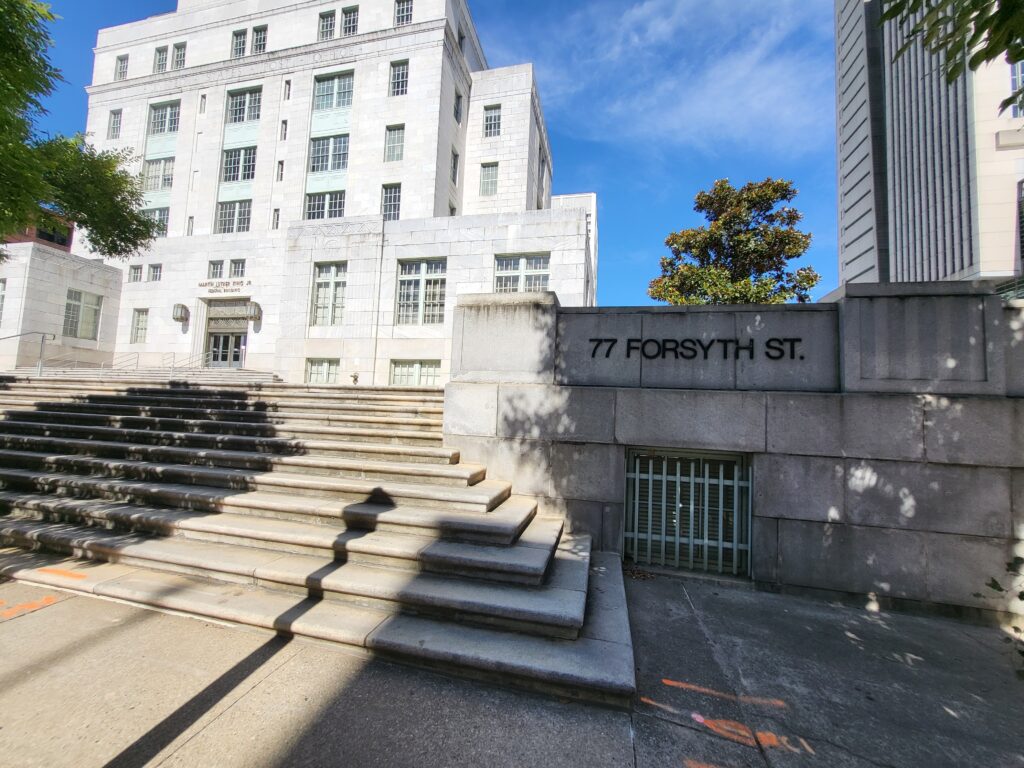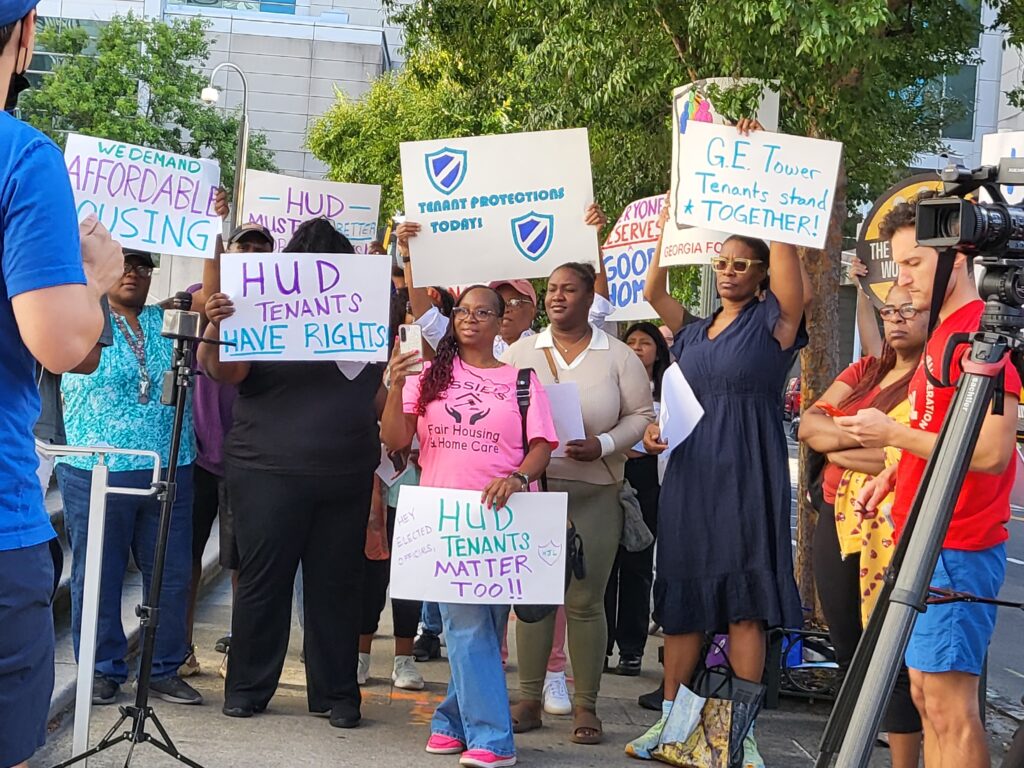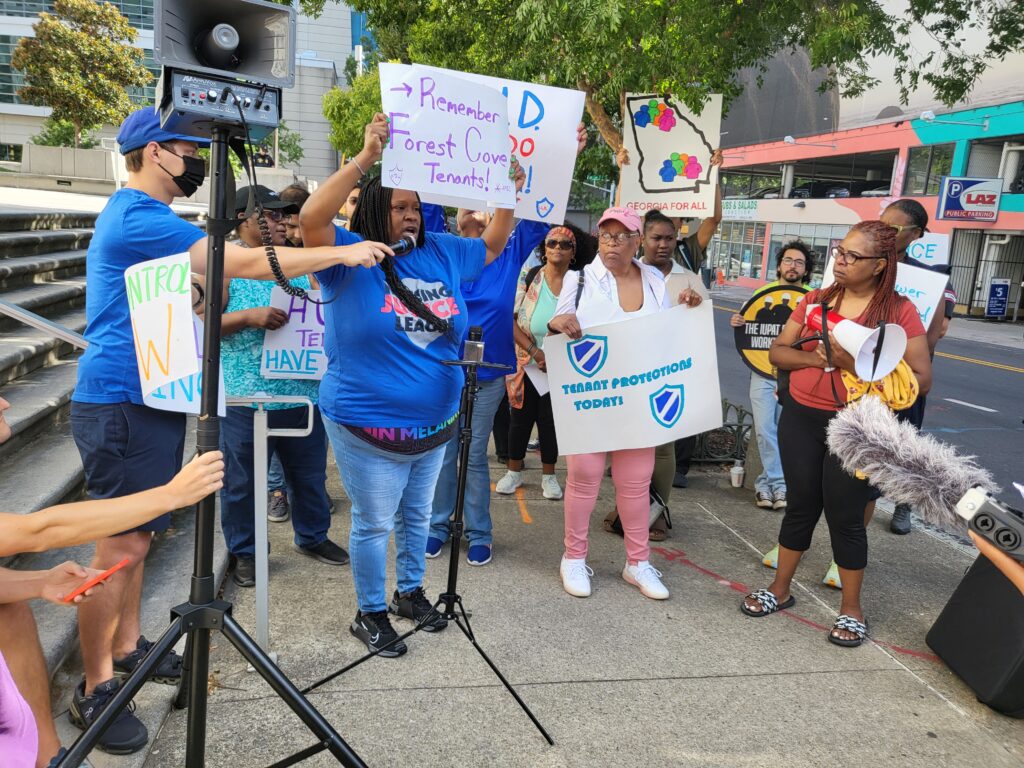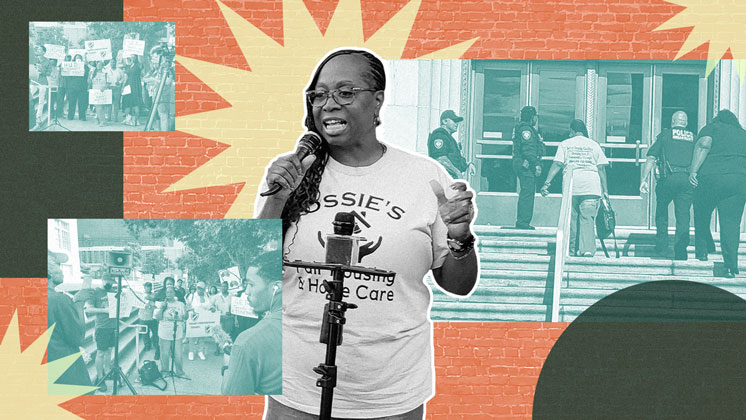“I rolled up my sleeve[s] to come and be the advocate.” These were the words of Diane Brown, an Albany, Georgia resident who came to Atlanta to rally in front of the regional offices of Housing and Urban Development (HUD) on behalf of tenets in Hudson Malone Towers, found on the city’s East side. Also present were residents of GE Tower in Mechanicsville and displaced residents of Forest Cove apartments in Atlanta.
Tenets across the state have organized with the Housing Justice League to bring awareness and visibility to the conditions and what they are dubbing “slumlord activity.” In Georgia, housing is an issue that residents have gone not only to the streets for but also to the ballot box to get elected officials to see that “housing is a human right.”
On September 4th, the HJL, representatives from the Atlanta Party for Socialism and Liberation, and Devin Barrington-Ward, candidate for Atlanta City Council Post 3 seat, joined the rally on a particularly windy day to express their want for tenant-focused housing action.
“I sent [Albany Housing Authority CEO Dr. William Myles] and [Albany Mayor Bo Dorough] paperwork, [I] even [sent some to] HUD, Brown declared. I got certified receipts [from] over a year [ago]. In 2021, when I sent [it], I never heard a response back from them. That is not right. That is what you call poor leadership. And when you got poor leadership – if they don’t want this job – move out the way.” [W]e are taxpayers and its taxpayer’s funding federal [worker’s] funding. Do your job. That’s all we ask; you come down and inspect these buildings and look over how these tenets [are] living.”
Following Ms. Brown’s testimony, she and representatives from the Housing Justice League in Atlanta were escorted into HUD offices for a one-on-one with staff. “These issues have been going on for almost five years now, where the tenants have been asking for some intervention and just trying to figure out how all the strings are connected to HUD,” the Housing Justice League said in a statement to TPP following the meeting.

“They have been unable to get any movement or any action from either HUD or from the participating jurisdiction that governs the agency that’s connected to the federal subsidies … so, we’re looking for some accountability in terms of how the management companies are operating when it comes to maintenance requirements, reporting and also file auditing.”
According to those familiar with the discussion, during the meeting with HUD, the agency agreed, within 30 days, to heed several conditions and demands intended to alleviate tenants’ circumstances. Chief among the demands is creating a residential board comprised of tenants from complexes with shared circumstances. Moreover, HUD agreed to develop a five-year budget plan that will be shared with tenants, and they would “make sure each resident had an opportunity to review it before it is voted and passed on.”
According to sources, HJL also pushed HUD to agree to implement an oversight committee that will “include a person from each of those apartment complexes, and it also would have a person to sit on the board in Albany …”

The conditions that Brown and other tenets described are not novel issues. Renters and the unhoused have felt the impact of Georgia’s landlord-friendly housing policies, even as housing advocates secured significant wins in recent legislative sessions with the passage of HB404. This bill guarantees that “any contract, lease, license, or similar agreement, oral or written, for the use of rental or real property as a dwelling place, is deemed to include a provision that the premises are fit for human habitation.”
However, residents at GE Tower have made public and private complaints that their building is overrun with mold and mice—both dead and alive—and have had to pay several thousand dollars in “junk fees,” sometimes in the form of outstanding rent charges the leasing office says haven’t been paid or documented as such.
Based on conversations with HJL, Towers residents continue to discuss how to organize and act to find some relief from the “gross arrearages” that management levied onto tenants’ bills and accounts.

Even so, according to residents who have spoken with The Peach Pit, a greater number of GE Tower residents have feared retaliation if they are caught speaking out against management’s practices.
“That is not how we do it in rural Georgia – they got a voice now. I’m their voice,” Brown said as she closed her speech.
“They call me radical. I don’t care about [being labeled as] radical, but I’m here to do a job. I’m going to stand up for my rights. You got to show me what democracy looks like. This is what democracy looks like.”

Daniel Richardson
Daniel Richardson is the managing editor of The Peach Pit. The formative years of his career were rooted in people-centered news coverage, particularly in the Atlanta and metro areas. His work has appeared in the Covington News, The Georgia State Signal, and others. After graduating from Georgia State University, he transferred his scholarship in Black, diasporic studies in movement journalism.

Awesome highlight of the energy of SWGA! Thanks